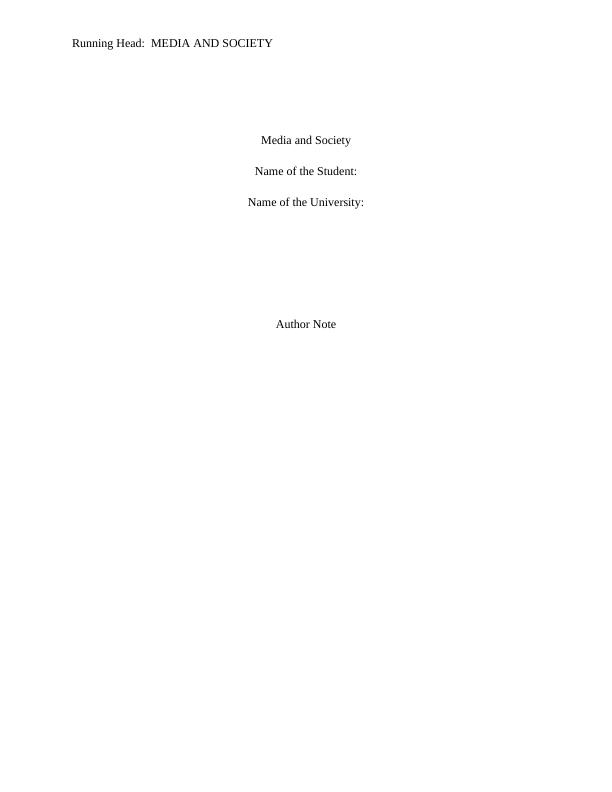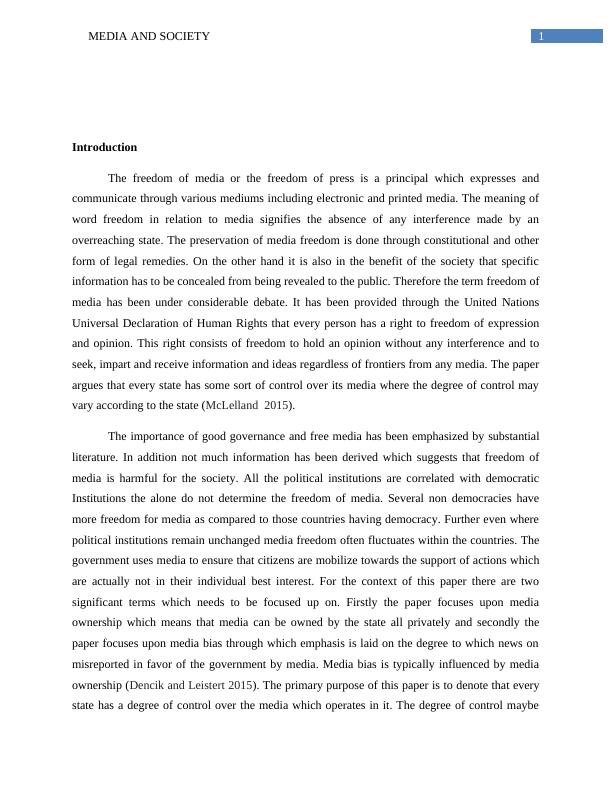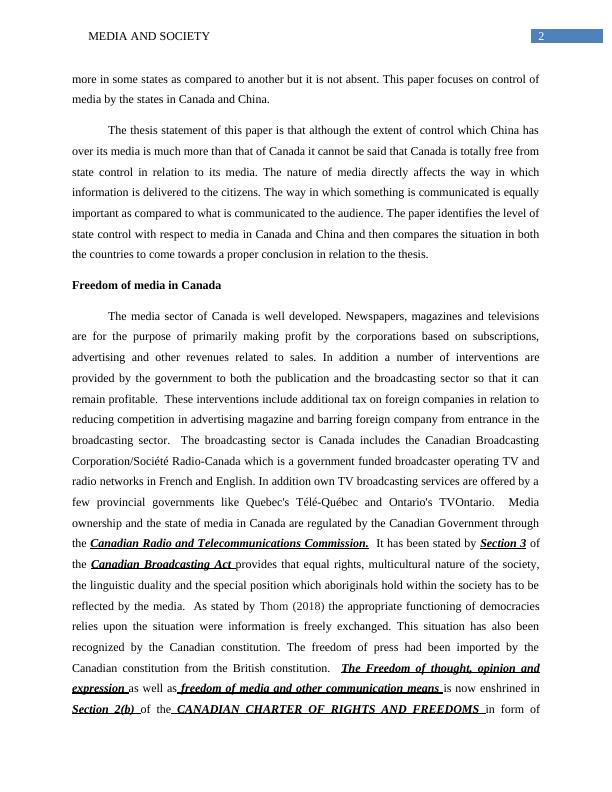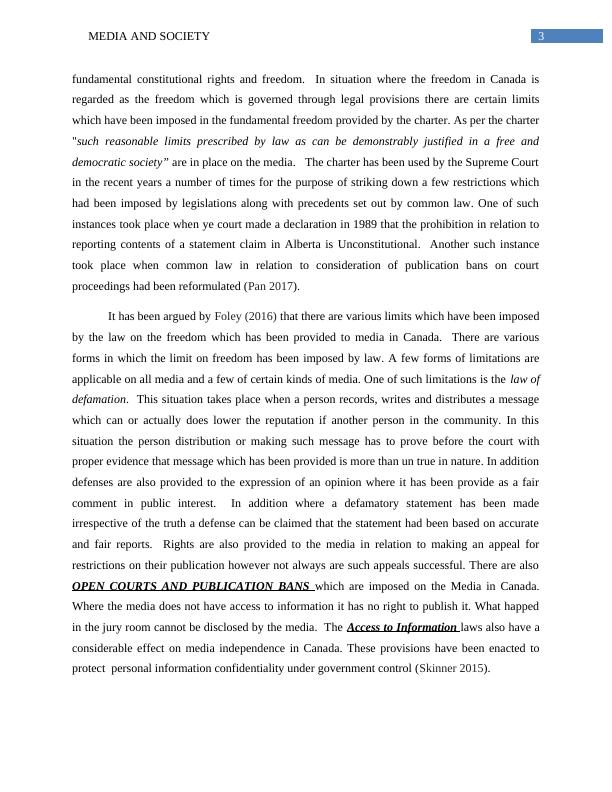Media and Society
16 Pages6184 Words340 Views
Added on 2023-06-14
About This Document
This paper discusses the degree of control that every state has over its media, with a focus on Canada and China. It examines the laws and regulations that govern media ownership and bias, and the impact of state control on media freedom and expression. The paper argues that although the extent of control which China has over its media is much more than that of Canada, it cannot be said that Canada is totally free from state control in relation to its media.
Media and Society
Added on 2023-06-14
ShareRelated Documents
Running Head: MEDIA AND SOCIETY
Media and Society
Name of the Student:
Name of the University:
Author Note
Media and Society
Name of the Student:
Name of the University:
Author Note

1MEDIA AND SOCIETY
Introduction
The freedom of media or the freedom of press is a principal which expresses and
communicate through various mediums including electronic and printed media. The meaning of
word freedom in relation to media signifies the absence of any interference made by an
overreaching state. The preservation of media freedom is done through constitutional and other
form of legal remedies. On the other hand it is also in the benefit of the society that specific
information has to be concealed from being revealed to the public. Therefore the term freedom of
media has been under considerable debate. It has been provided through the United Nations
Universal Declaration of Human Rights that every person has a right to freedom of expression
and opinion. This right consists of freedom to hold an opinion without any interference and to
seek, impart and receive information and ideas regardless of frontiers from any media. The paper
argues that every state has some sort of control over its media where the degree of control may
vary according to the state (McLelland 2015).
The importance of good governance and free media has been emphasized by substantial
literature. In addition not much information has been derived which suggests that freedom of
media is harmful for the society. All the political institutions are correlated with democratic
Institutions the alone do not determine the freedom of media. Several non democracies have
more freedom for media as compared to those countries having democracy. Further even where
political institutions remain unchanged media freedom often fluctuates within the countries. The
government uses media to ensure that citizens are mobilize towards the support of actions which
are actually not in their individual best interest. For the context of this paper there are two
significant terms which needs to be focused up on. Firstly the paper focuses upon media
ownership which means that media can be owned by the state all privately and secondly the
paper focuses upon media bias through which emphasis is laid on the degree to which news on
misreported in favor of the government by media. Media bias is typically influenced by media
ownership (Dencik and Leistert 2015). The primary purpose of this paper is to denote that every
state has a degree of control over the media which operates in it. The degree of control maybe
Introduction
The freedom of media or the freedom of press is a principal which expresses and
communicate through various mediums including electronic and printed media. The meaning of
word freedom in relation to media signifies the absence of any interference made by an
overreaching state. The preservation of media freedom is done through constitutional and other
form of legal remedies. On the other hand it is also in the benefit of the society that specific
information has to be concealed from being revealed to the public. Therefore the term freedom of
media has been under considerable debate. It has been provided through the United Nations
Universal Declaration of Human Rights that every person has a right to freedom of expression
and opinion. This right consists of freedom to hold an opinion without any interference and to
seek, impart and receive information and ideas regardless of frontiers from any media. The paper
argues that every state has some sort of control over its media where the degree of control may
vary according to the state (McLelland 2015).
The importance of good governance and free media has been emphasized by substantial
literature. In addition not much information has been derived which suggests that freedom of
media is harmful for the society. All the political institutions are correlated with democratic
Institutions the alone do not determine the freedom of media. Several non democracies have
more freedom for media as compared to those countries having democracy. Further even where
political institutions remain unchanged media freedom often fluctuates within the countries. The
government uses media to ensure that citizens are mobilize towards the support of actions which
are actually not in their individual best interest. For the context of this paper there are two
significant terms which needs to be focused up on. Firstly the paper focuses upon media
ownership which means that media can be owned by the state all privately and secondly the
paper focuses upon media bias through which emphasis is laid on the degree to which news on
misreported in favor of the government by media. Media bias is typically influenced by media
ownership (Dencik and Leistert 2015). The primary purpose of this paper is to denote that every
state has a degree of control over the media which operates in it. The degree of control maybe

2MEDIA AND SOCIETY
more in some states as compared to another but it is not absent. This paper focuses on control of
media by the states in Canada and China.
The thesis statement of this paper is that although the extent of control which China has
over its media is much more than that of Canada it cannot be said that Canada is totally free from
state control in relation to its media. The nature of media directly affects the way in which
information is delivered to the citizens. The way in which something is communicated is equally
important as compared to what is communicated to the audience. The paper identifies the level of
state control with respect to media in Canada and China and then compares the situation in both
the countries to come towards a proper conclusion in relation to the thesis.
Freedom of media in Canada
The media sector of Canada is well developed. Newspapers, magazines and televisions
are for the purpose of primarily making profit by the corporations based on subscriptions,
advertising and other revenues related to sales. In addition a number of interventions are
provided by the government to both the publication and the broadcasting sector so that it can
remain profitable. These interventions include additional tax on foreign companies in relation to
reducing competition in advertising magazine and barring foreign company from entrance in the
broadcasting sector. The broadcasting sector is Canada includes the Canadian Broadcasting
Corporation/Société Radio-Canada which is a government funded broadcaster operating TV and
radio networks in French and English. In addition own TV broadcasting services are offered by a
few provincial governments like Quebec's Télé-Québec and Ontario's TVOntario. Media
ownership and the state of media in Canada are regulated by the Canadian Government through
the Canadian Radio and Telecommunications Commission. It has been stated by Section 3 of
the Canadian Broadcasting Act provides that equal rights, multicultural nature of the society,
the linguistic duality and the special position which aboriginals hold within the society has to be
reflected by the media. As stated by Thom (2018) the appropriate functioning of democracies
relies upon the situation were information is freely exchanged. This situation has also been
recognized by the Canadian constitution. The freedom of press had been imported by the
Canadian constitution from the British constitution. The Freedom of thought, opinion and
expression as well as freedom of media and other communication means is now enshrined in
Section 2(b) of the CANADIAN CHARTER OF RIGHTS AND FREEDOMS in form of
more in some states as compared to another but it is not absent. This paper focuses on control of
media by the states in Canada and China.
The thesis statement of this paper is that although the extent of control which China has
over its media is much more than that of Canada it cannot be said that Canada is totally free from
state control in relation to its media. The nature of media directly affects the way in which
information is delivered to the citizens. The way in which something is communicated is equally
important as compared to what is communicated to the audience. The paper identifies the level of
state control with respect to media in Canada and China and then compares the situation in both
the countries to come towards a proper conclusion in relation to the thesis.
Freedom of media in Canada
The media sector of Canada is well developed. Newspapers, magazines and televisions
are for the purpose of primarily making profit by the corporations based on subscriptions,
advertising and other revenues related to sales. In addition a number of interventions are
provided by the government to both the publication and the broadcasting sector so that it can
remain profitable. These interventions include additional tax on foreign companies in relation to
reducing competition in advertising magazine and barring foreign company from entrance in the
broadcasting sector. The broadcasting sector is Canada includes the Canadian Broadcasting
Corporation/Société Radio-Canada which is a government funded broadcaster operating TV and
radio networks in French and English. In addition own TV broadcasting services are offered by a
few provincial governments like Quebec's Télé-Québec and Ontario's TVOntario. Media
ownership and the state of media in Canada are regulated by the Canadian Government through
the Canadian Radio and Telecommunications Commission. It has been stated by Section 3 of
the Canadian Broadcasting Act provides that equal rights, multicultural nature of the society,
the linguistic duality and the special position which aboriginals hold within the society has to be
reflected by the media. As stated by Thom (2018) the appropriate functioning of democracies
relies upon the situation were information is freely exchanged. This situation has also been
recognized by the Canadian constitution. The freedom of press had been imported by the
Canadian constitution from the British constitution. The Freedom of thought, opinion and
expression as well as freedom of media and other communication means is now enshrined in
Section 2(b) of the CANADIAN CHARTER OF RIGHTS AND FREEDOMS in form of

3MEDIA AND SOCIETY
fundamental constitutional rights and freedom. In situation where the freedom in Canada is
regarded as the freedom which is governed through legal provisions there are certain limits
which have been imposed in the fundamental freedom provided by the charter. As per the charter
"such reasonable limits prescribed by law as can be demonstrably justified in a free and
democratic society” are in place on the media. The charter has been used by the Supreme Court
in the recent years a number of times for the purpose of striking down a few restrictions which
had been imposed by legislations along with precedents set out by common law. One of such
instances took place when ye court made a declaration in 1989 that the prohibition in relation to
reporting contents of a statement claim in Alberta is Unconstitutional. Another such instance
took place when common law in relation to consideration of publication bans on court
proceedings had been reformulated (Pan 2017).
It has been argued by Foley (2016) that there are various limits which have been imposed
by the law on the freedom which has been provided to media in Canada. There are various
forms in which the limit on freedom has been imposed by law. A few forms of limitations are
applicable on all media and a few of certain kinds of media. One of such limitations is the law of
defamation. This situation takes place when a person records, writes and distributes a message
which can or actually does lower the reputation if another person in the community. In this
situation the person distribution or making such message has to prove before the court with
proper evidence that message which has been provided is more than un true in nature. In addition
defenses are also provided to the expression of an opinion where it has been provide as a fair
comment in public interest. In addition where a defamatory statement has been made
irrespective of the truth a defense can be claimed that the statement had been based on accurate
and fair reports. Rights are also provided to the media in relation to making an appeal for
restrictions on their publication however not always are such appeals successful. There are also
OPEN COURTS AND PUBLICATION BANS which are imposed on the Media in Canada.
Where the media does not have access to information it has no right to publish it. What happed
in the jury room cannot be disclosed by the media. The Access to Information laws also have a
considerable effect on media independence in Canada. These provisions have been enacted to
protect personal information confidentiality under government control (Skinner 2015).
fundamental constitutional rights and freedom. In situation where the freedom in Canada is
regarded as the freedom which is governed through legal provisions there are certain limits
which have been imposed in the fundamental freedom provided by the charter. As per the charter
"such reasonable limits prescribed by law as can be demonstrably justified in a free and
democratic society” are in place on the media. The charter has been used by the Supreme Court
in the recent years a number of times for the purpose of striking down a few restrictions which
had been imposed by legislations along with precedents set out by common law. One of such
instances took place when ye court made a declaration in 1989 that the prohibition in relation to
reporting contents of a statement claim in Alberta is Unconstitutional. Another such instance
took place when common law in relation to consideration of publication bans on court
proceedings had been reformulated (Pan 2017).
It has been argued by Foley (2016) that there are various limits which have been imposed
by the law on the freedom which has been provided to media in Canada. There are various
forms in which the limit on freedom has been imposed by law. A few forms of limitations are
applicable on all media and a few of certain kinds of media. One of such limitations is the law of
defamation. This situation takes place when a person records, writes and distributes a message
which can or actually does lower the reputation if another person in the community. In this
situation the person distribution or making such message has to prove before the court with
proper evidence that message which has been provided is more than un true in nature. In addition
defenses are also provided to the expression of an opinion where it has been provide as a fair
comment in public interest. In addition where a defamatory statement has been made
irrespective of the truth a defense can be claimed that the statement had been based on accurate
and fair reports. Rights are also provided to the media in relation to making an appeal for
restrictions on their publication however not always are such appeals successful. There are also
OPEN COURTS AND PUBLICATION BANS which are imposed on the Media in Canada.
Where the media does not have access to information it has no right to publish it. What happed
in the jury room cannot be disclosed by the media. The Access to Information laws also have a
considerable effect on media independence in Canada. These provisions have been enacted to
protect personal information confidentiality under government control (Skinner 2015).

End of preview
Want to access all the pages? Upload your documents or become a member.
Related Documents
Liberal Democracy in Canadalg...
|8
|1770
|343
European Convention on Human Rightlg...
|12
|3442
|23
BZ101 Business Communicationlg...
|5
|877
|25
Comparison of Media and Media Censorship in USA and Chinalg...
|9
|2175
|439
Media: A Double Edged Weaponlg...
|6
|1233
|278
Analysis of Dictatorship to Democracylg...
|5
|1007
|267
